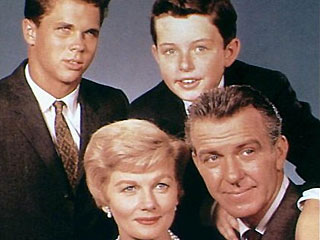
MY TURN column
The Courier-Post
June 18, 2009
by DOUG OTTO
As Father's Day approaches, I'm reminded of the dozens of television dads I have invited into my living room since the '50s.
Yesteryear's television fathers, revered by their families, were undisputed heads of their households. These dads seemed to have all the answers, ranging from the value of the American work ethic to dating to training the family pet.
Today, many of these studio fathers are less than model citizens for children.
As an educator, I see firsthand that my students don't want a buffoon for a father, but rather one with a well-developed sense of humor. Not a despot, but a dad willing to admit he can sometimes be wrong.
Because today's media-savvy kids crave positive adult male images, I'd like to offer my nominees for TV's Paternal Hall of Fame and Hall of Shame.
Demon dads
Al Bundy:
"Married . . . with Children" (1987-97) -- Bundy was one of TV's grumpiest, most unsophisticated guys. He had a deplorable attitude toward his family, continually exhibited poor judgment, hated work and was careless about hygiene. He offered a lesson on how not to be a man.
Homer Simpson:
"The Simpsons" (1989-present) -- Lazy and slovenly, Homer stumbles through life with indifference. He is a prime example of TV's ubiquitous portrayal of the bumbling idiot dad. Rude and crude, Homer once said, "Kids, you tried your best and you failed miserably. The lesson is, never try."
Archie Bunker:
"All in the Family" (1971-79) -- This show, a critically acclaimed groundbreaking comedy, centered around caustic family debates, as well as the offensive behavior of Archie, who often replaced the cigar in his mouth with his foot. Has any character been more demeaning to his spouse? He often spouted racial epithets and called his son-in-law "meathead" and his wife "dingbat."
Peter Griffin:
"Family Guy" (1999, 2002-05, 2007-present) -- Peter heads a dysfunctional family with a penchant for controversy, irreverent humor and indecency. The Parents Television Council named the program the "worst prime-time shows for family viewing."
Ray and Frank Barone:
"Everybody Loves Raymond" (1996-2005) -- The apple doesn't fall far from the tree with this father-and-son combo. Ray is an incompetent manchild who works from home but doesn't spend much time with his wife and children. His irascible father sits in a recliner, unbuckles his pants and verbally excoriates his two sons.
Anchored angels
Hank Hill:
"King of the Hill" (1995-2009) -- He may be just a Texas propane salesman, but Hank teaches his son, Bobby, the meaning of hard work, dedication and loyalty. He has a healthy relationship with his wife and the rest of his family, and he's always there when Bobby needs him.
Cliff Huxtable:
"The Cosby Show" (1984-1992) -- Dr. Huxtable's advice to his children was always based on common sense, mixed with a wisecrack. He taught his children that personal responsibility was the key to success in life. The character's aura of classiness became a signature style, addressing a long history of negative minority portrayals on television.
Andy Taylor:
"The Andy Griffith Show" (1960-68) -- The sheriff may have appeared as a naive rural rube, but he represented family and community values. For an example of his noble interaction with his son, watch the episode titled "Opie the Birdman."
John Walton:
"The Waltons" (1972-81) -- John is a hard-working, industrious man running the family's small Appalachian sawmill during the Depression. He's normally very good-natured and wise, but fearless and ready to stand up to a challenge and tell it like it is.
Ward Cleaver:
"Leave It To Beaver" (1957-1963) -- Ward embodied the stereotypical 1950s dad. While his dramatic function was to impart a moral instruction to both of his errant sons, even when frustrated, the man hardly raised his voice. He remains my favorite TV dad because of his steadfastness and ability to admit his humanness to his sons.
Rather than view TV's best fictional fathers as archaic models, I choose to view them with a nostalgic fondness. While they could never replace our real dads, they remind us that when it comes to raising children, standards are appreciated and often desired.
They weren't always perfect. They were often stern. But a kid almost felt he was being addressed personally when Ward Cleaver said, "Wally, believe it or not, I was your age once."